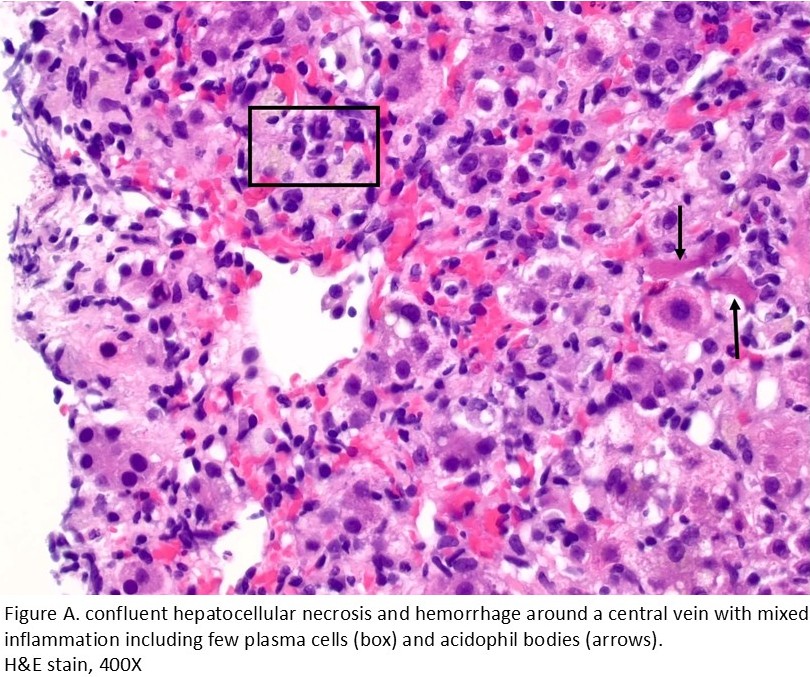Monday Poster Session
Category: Liver
P3841 - Acute Severe Autoimmune Hepatitis – Prompt Recognition and Glucocorticoid Therapy
Monday, October 27, 2025
10:30 AM - 4:00 PM PDT
Location: Exhibit Hall

Samuel Y. Jo, MD
Robert Wood Johnson Medical School, Rutgers University
New Brunswick, NJ
Presenting Author(s)
Samuel Y. Jo, MD, Rachel Hudacko, MD, Anish V. Patel, MD
Robert Wood Johnson Medical School, Rutgers University, New Brunswick, NJ
Introduction: Autoimmune hepatitis (AIH) is an immune mediated disease defined by characteristic histologic features, elevated liver enzymes and presence of one or more characteristic autoantibodies. This disease can affect all age groups, gender and ethnicities with varied presentations ranging from asymptomatic to acute liver failure (ALF). The acute form is a rare cause of ALF and is subdivided into three categories: non-severe, severe, and fulminant AIH.
Case Description/
Methods: A 20-year-old male with hypothyroidism and chronic colitis (not on therapy) presented to the emergency room for evaluation of jaundice. He was asymptomatic aside from intermittent rectal bleeding due to colitis. Vitals were stable. Exam was notable for jaundice but without asterixis, ascites, or encephalopathy. Liver enzymes were elevated with a peak value of ALT 2979 IU/L, AST 2079 IU/L, Bilirubin 12.3 mg/dL, Alkaline phosphatase 287 IU/L and INR of 1.62. ANA titer was 1:80, but other serologic workup including IgG, Alpha 1 Antitrypsin, Liver Kidney Microsomal antibody, Smooth Muscle Antibody, Anti-mitochondrial Antibody, Ceruloplasmin and viral hepatitis were within the laboratory reference range. Liver biopsy was obtained revealing severe active hepatitis with perivenular confluent necrosis and focal cholestasis. Inflammation was mixed, comprising of lymphocytes, neutrophils, macrophages, eosinophils, and areas of increased numbers of plasma cells. Colonoscopy during this admission showed moderate inflammation of the entire colon. After all alternative causes of liver injury were excluded, the patient started steroid therapy (intravenous methylprednisolone 60mg daily) for management of acute severe autoimmune hepatitis (AS-AIH) and colitis with improvement of his liver serologies. He was discharged on Prednisone with follow up, where his serologies have markedly improved.
Discussion: We present here a case of AS-AIH, which is a rare disease with poor outcomes, especially with delayed treatment. While severe hepatitis can be categorized with serologies including INR > 1.5 and elevated bilirubin, in AS-AIH patients may be autoantibody negative, have normal IgG and less specific histologic features. Early consideration of liver biopsy, in addition to a clinical history, is crucial to support the diagnosis and help exclude other disease processes. Prompt initiation of high dose glucocorticoid therapy improves outcomes, as well as early consideration of liver transplantation should the patient not respond to medical therapy.

Figure: Liver Biopsy Histology
Disclosures:
Samuel Jo indicated no relevant financial relationships.
Rachel Hudacko indicated no relevant financial relationships.
Anish Patel indicated no relevant financial relationships.
Samuel Y. Jo, MD, Rachel Hudacko, MD, Anish V. Patel, MD. P3841 - Acute Severe Autoimmune Hepatitis – Prompt Recognition and Glucocorticoid Therapy, ACG 2025 Annual Scientific Meeting Abstracts. Phoenix, AZ: American College of Gastroenterology.
Robert Wood Johnson Medical School, Rutgers University, New Brunswick, NJ
Introduction: Autoimmune hepatitis (AIH) is an immune mediated disease defined by characteristic histologic features, elevated liver enzymes and presence of one or more characteristic autoantibodies. This disease can affect all age groups, gender and ethnicities with varied presentations ranging from asymptomatic to acute liver failure (ALF). The acute form is a rare cause of ALF and is subdivided into three categories: non-severe, severe, and fulminant AIH.
Case Description/
Methods: A 20-year-old male with hypothyroidism and chronic colitis (not on therapy) presented to the emergency room for evaluation of jaundice. He was asymptomatic aside from intermittent rectal bleeding due to colitis. Vitals were stable. Exam was notable for jaundice but without asterixis, ascites, or encephalopathy. Liver enzymes were elevated with a peak value of ALT 2979 IU/L, AST 2079 IU/L, Bilirubin 12.3 mg/dL, Alkaline phosphatase 287 IU/L and INR of 1.62. ANA titer was 1:80, but other serologic workup including IgG, Alpha 1 Antitrypsin, Liver Kidney Microsomal antibody, Smooth Muscle Antibody, Anti-mitochondrial Antibody, Ceruloplasmin and viral hepatitis were within the laboratory reference range. Liver biopsy was obtained revealing severe active hepatitis with perivenular confluent necrosis and focal cholestasis. Inflammation was mixed, comprising of lymphocytes, neutrophils, macrophages, eosinophils, and areas of increased numbers of plasma cells. Colonoscopy during this admission showed moderate inflammation of the entire colon. After all alternative causes of liver injury were excluded, the patient started steroid therapy (intravenous methylprednisolone 60mg daily) for management of acute severe autoimmune hepatitis (AS-AIH) and colitis with improvement of his liver serologies. He was discharged on Prednisone with follow up, where his serologies have markedly improved.
Discussion: We present here a case of AS-AIH, which is a rare disease with poor outcomes, especially with delayed treatment. While severe hepatitis can be categorized with serologies including INR > 1.5 and elevated bilirubin, in AS-AIH patients may be autoantibody negative, have normal IgG and less specific histologic features. Early consideration of liver biopsy, in addition to a clinical history, is crucial to support the diagnosis and help exclude other disease processes. Prompt initiation of high dose glucocorticoid therapy improves outcomes, as well as early consideration of liver transplantation should the patient not respond to medical therapy.

Figure: Liver Biopsy Histology
Disclosures:
Samuel Jo indicated no relevant financial relationships.
Rachel Hudacko indicated no relevant financial relationships.
Anish Patel indicated no relevant financial relationships.
Samuel Y. Jo, MD, Rachel Hudacko, MD, Anish V. Patel, MD. P3841 - Acute Severe Autoimmune Hepatitis – Prompt Recognition and Glucocorticoid Therapy, ACG 2025 Annual Scientific Meeting Abstracts. Phoenix, AZ: American College of Gastroenterology.
